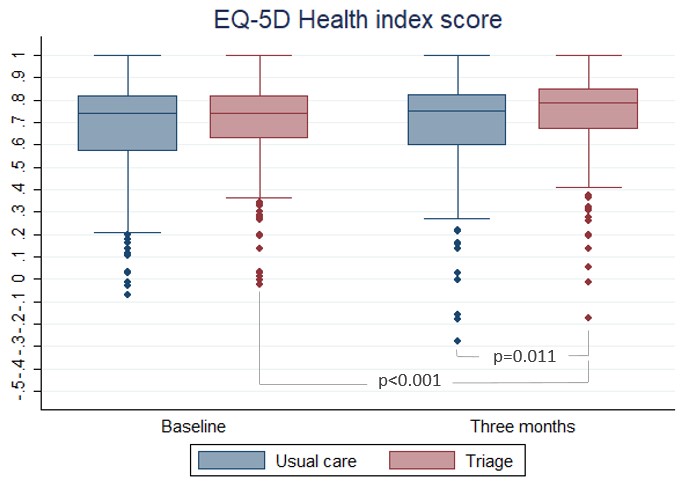Session Information
Date: Monday, November 8, 2021
Title: Health Services Research Poster II: Care Models and Innovation (1061–1082)
Session Type: Poster Session C
Session Time: 8:30AM-10:30AM
Background/Purpose: General practitioners have difficulties recognising inflammatory rheumatic diseases (IRD), reflected by a low incidence rate of IRD in newly referred arthralgia patients. On the other hand, IRD needs to be diagnosed and treated as early as possible to overcome progression.
The objective of this study is to assess whether triage by a rheumatologist in a primary care setting effectively increases the number of appropriately referred patients to secondary care and to investigate its impact on health care utilization and patient experience.
Methods: This study follows a cluster randomized controlled trial design and is performed in the Netherlands. Triage by an experienced rheumatologist in a primary care setting will be compared to usual care where patients are referred to a rheumatologist in secondary care by advice of their own general practitioner. The primary outcome was the percentage of IRD diagnoses in referred patients as assessed by a rheumatologist. Health care utilization (iMCQ), quality of life (EQ-5D) and quality of care (CQI) were determined after three months of follow-up.
Results: A total of 544 participants were included with a mean age of 51.4 years and 24% were men. Of all referred patients, 51% had an IRD in the triage group versus 21% in the usual care group (OR 3.85, p< 0.001). After three months, triage patients showed to have a lower health care utilization (p=0.009) mainly regarding secondary care, and higher quality of life (p=0.011), without a decline in quality of care (p=0.712).
Conclusion: Triage by a rheumatologist in primary care provides appropriate care at the right place with good quality for patients with MSC. While these results are encouraging, more long term evidence is needed of value on cost-effectiveness before implementing this strategy in daily practice.
 Figure 1: Change of quality of life measured by the health index score over three months after initial visit to rheumatologist
Figure 1: Change of quality of life measured by the health index score over three months after initial visit to rheumatologist
To cite this abstract in AMA style:
van Delft E, Lopes Barreto D, Han H, Tchetverikov I, Evertse A, Kuijper M, Hazes M, Weel-Koenders A. Effect of Triage by a Rheumatologist in a Primary Care Setting [abstract]. Arthritis Rheumatol. 2021; 73 (suppl 9). https://acrabstracts.org/abstract/effect-of-triage-by-a-rheumatologist-in-a-primary-care-setting/. Accessed .« Back to ACR Convergence 2021
ACR Meeting Abstracts - https://acrabstracts.org/abstract/effect-of-triage-by-a-rheumatologist-in-a-primary-care-setting/
